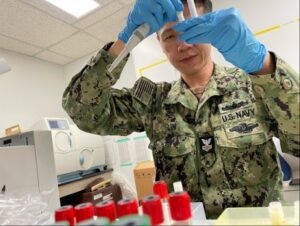
Hospital Corpsman First Class Jin Lin processed biological samples in Yokosuka, Japan, during a U.S. Naval Medical Research Unit (NAMRU) INDO PACIFIC research study on natural and vaccine-derived immunity of respiratory diseases in U.S. Navy sailors and marines late last year. Photo by Sidney Hinds, Naval Medical Research Command
WASHINGTON, DC — Recent data from DoD seems to confirm what researchers and physicians have been saying for years—that individuals who receive the COVID-19 vaccine are less likely to experience long-term health effects than those who do not.
Some Republican legislators argue, however, that there is still uncertainty over whether some portions of those effects were caused by the vaccine rather than the virus and that inconsistencies in data collection by DoD put their findings in doubt.
These legislators are using this uncertainty to continue to attack the DoD’s decision to require the vaccine for servicemembers — a requirement that has since been lifted. Others are voicing more-extreme views, including that DoD is taking an active part in a larger conspiracy against the American people.
“In 2022, we saw heart-related conditions like hypertension and cardiomyopathy among servicemembers increase by 47% and 94%, respectively, over DoD averages,” said Rep. Jim Banks (R-IN), at a House Armed Services Subcommittee on Military Personnel hearing last month. “We seek clarity for the servicemembers who took the COVID-19 vaccine, for their families, and for everyone’s future health and well-being. We seek to understand the extent to which the Department of Defense has monitored the impact of COVID-19 on our military personnel, including any potential correlation between the virus itself and the development of medical conditions. Moreover, we aim to examine the data surrounding the administration of the COVID-19 vaccine within our ranks, evaluating its safety profile and any observed trends in adverse reactions or health outcomes.”
Lester Martinez-Lopez, MD, assistant secretary of defense for health affairs, laid out the data simply, noting that there was little room for doubt.
“The department’s data shows that unvaccinated individuals with a reported COVID-19 infection were at significantly higher risk of developing three cardiac conditions: myocarditis, pericarditis and acute myocardial infarction, as compared to individuals who received a COVID-19 vaccine,” he explained. “Among the 31 active duty servicemembers who died from COVID-19, none of them were fully vaccinated.”
Decreased Risk
He added, “The safety, health and readiness of the force and the servicemembers is what’s important to me. The data is very clear. You have a higher risk of developing these conditions if you got the disease without the vaccine. The vaccine doesn’t exempt you from getting these complications, but it really does decrease the risk to servicemembers.”
DoD officials also explained the data inconsistencies that had troubled legislators. The first was a potentially significant underreporting of COVID-19 infection among servicemembers. Based on the amount of antibodies detected in serum tests, the actual number of infections could range from 1.7 to 9.3-times greater than reported. According to Martinez, this likely underrepresented the impact of the virus on adverse health conditions.
The other data inconsistency was caused by human error in the Defense Medical Epidemiology Database (DMEDS), which effectively “corrupted” some of the data.
“There was a programming error that we became aware of in January 2022,” explained Shauna Stahlman, senior epidemiologist at the Armed Forces Health Surveillance Division. “An analyst had used a count function instead of a sum function, which led to data between 2016 and 2020 becoming corrupted. It was immediately corrected, and since then we’ve implemented additional controls.”
Banks also questioned why, in tracking adverse health conditions, researchers looked at 45 days post-infection but only 21 days post-vaccine injection.
“It seems to me that you’re skewing the data to justify your use of the vaccine,” Banks said. “How are we to trust the department and the Biden administration that you all are being honest, when it reaches a conclusion that all of these medical problems were due to the virus and not the vaccine?”
The timeframes, Stahlman explained, had been calculated with the help of cardiac event experts.
“In talking with cardiologists … clinically following the myocarditis and pericarditis cases in DoD, … if they occur as a result of a vaccine, they will most likely occur within 21 days,” she said. “We also know when working with cardiologist experts in DoD [that,] if you’re going to have myocarditis or pericarditis due to infection, it’s most likely to show up within that 45-day period.”
Also present at the hearing was committee member Rep. Matt Gaetz (R-FL), who has espoused some of the most-extreme conspiracy theories regarding COVID-19 and the vaccine, including that it was man-made, and that the federal government conspired with technology and pharmaceutical companies to limit free speech and monetize the pandemic.
Following the hearing, he wrote an editorial for the far-right online website The National Pulse, calling for “vaccine damage accountability” for servicemembers.
“There has been no accountability for the prolonged period during which the data was described as ‘corrupted’ and ‘inaccurate,’ sparking significant concern over medical diagnoses,” Gaetz wrote. “In practice, this flawed data would have informed medical treatments and strategies for years, suggesting that service members might have been subjected to misguided or detrimental treatment plans, exacerbating potential harm. More importantly, we are now faced with the possibility of adverse effects on the health of thousands of our volunteer service members who were impacted by an illegal mandate to receive an experimental vaccine.”


